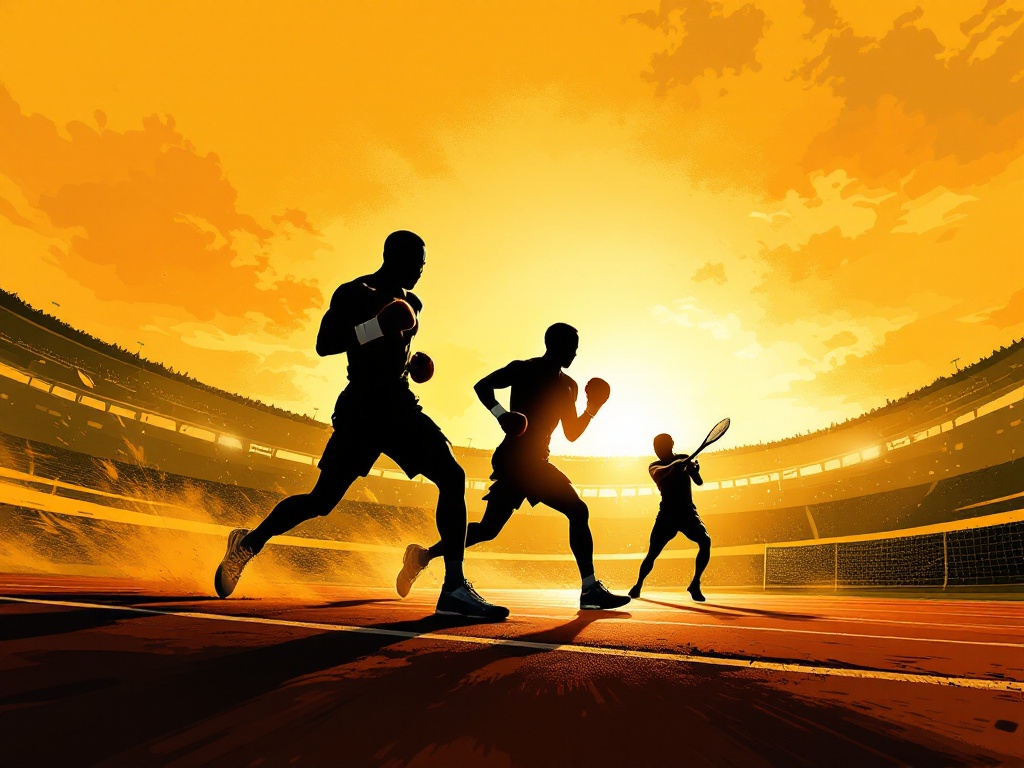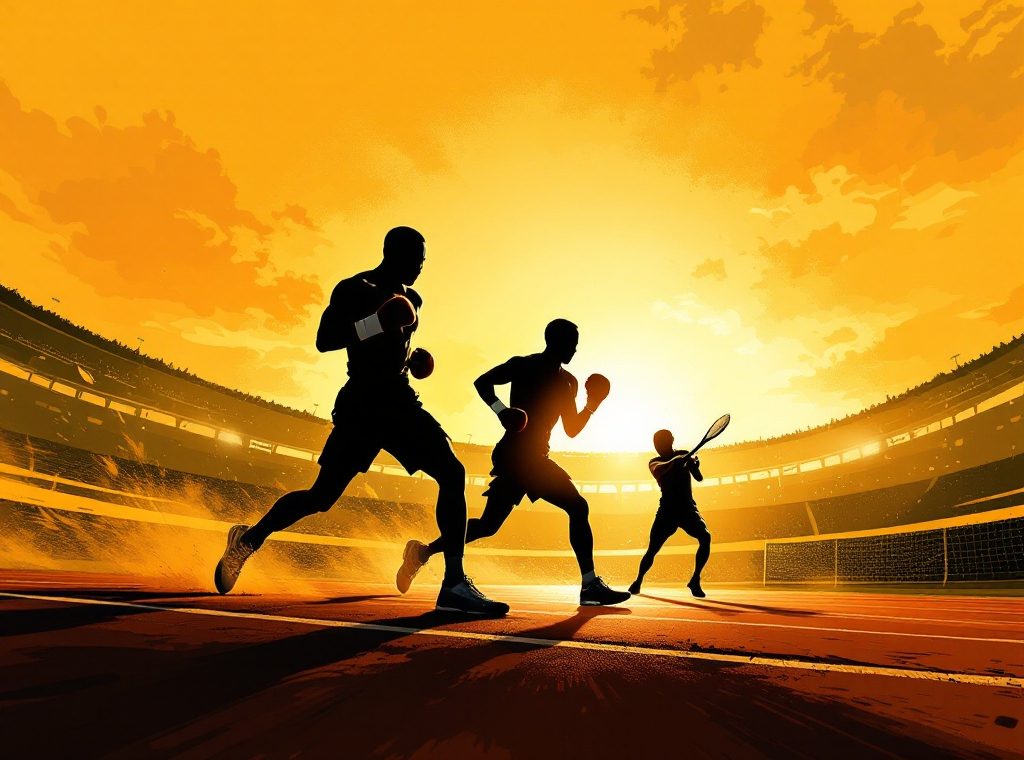The Greatest Athletes of All Time
Who is the greatest athlete of all time? Dive into this exploration of athletic greatness, examining legends like Muhammad Ali, Usain Bolt, and Serena Williams. Discover the criteria defining iconic athletes, from Olympic medals and world records to their lasting cultural impact. Explore the roles of expert analysis and AI in ranking athletic prowess, considering speed, endurance, and power. Uncover the fascinating debate surrounding the GOAT title and the enduring legacies of these remarkable individuals. Start reading now and join the conversation!
Important information

- Greatness in athletics is determined by a combination of consistent high performance, a lasting impact on the sport, and the ability to perform under pressure.
- Championships, MVP awards, world records, and Olympic medals are key indicators of athletic success, showcasing skill, dominance, and dedication.
- Athletes like Muhammad Ali, Serena Williams, and Usain Bolt are considered some of the greatest of all time due to their achievements and cultural influence.
- The “Greatest Of All Time” (GOAT) debate is subjective, with criteria varying from athletic prowess and achievements to cultural impact and influence.
- Many top athletes have left a lasting legacy extending beyond sports, advocating for social justice and inspiring positive change.
Understanding the Greatest Athletes of All Time
Muhammad Ali, Usain Bolt, and Serena Williams: these names are synonymous with athletic excellence. Ali, the boxing legend, Bolt, the track and field phenomenon, and Williams, the tennis titan, each reigned supreme in their respective sports. But what elevates an athlete to legendary status? Exceptional skill is undoubtedly crucial, alongside record-breaking feats and a lasting impact on their sport. Consistent high performance under pressure and career longevity are also essential ingredients. We often turn to statistics—wins, championships, and personal bests—to quantify greatness. These figures offer a glimpse into an athlete’s accomplishments. Ali’s influence, for instance, extended far beyond the boxing ring, transforming him into a global icon. Bolt redefined speed, earning the moniker “fastest man alive.” Serena’s decades-long dominance in tennis shattered numerous records. These athletes embody true greatness, inspiring generations with their achievements.
Defining Athletic Greatness: Criteria and Factors
Athletic greatness is defined by more than just championships and records, although those achievements are important. An athlete’s impact on their sport is also a significant factor. True greatness demands consistent high-level performance, a sustained and influential career, and the ability to excel under pressure. Ultimately, it’s a combination of several key elements:
- consistent performance,
- a long and impactful career,
- the ability to shine when the stakes are high.
Role of Voter and Fan Rankings
Public perception of athletic greatness is significantly shaped by fan and voter opinions, yet these perspectives often diverge. Personal biases heavily influence individual rankings, making athlete comparisons complex. One fan’s idol could be another’s forgotten player.
Some prioritize statistical dominance, while others may champion sportsmanship. The emphasis on championships further complicates rankings. Ultimately, varying criteria yield varying outcomes, highlighting the subjective nature of such evaluations.
Impact of Sports Experts and AI in Ranking Athletes
Sports experts use their knowledge to evaluate athletic performance based on metrics and historical data. For example, they can assess a player’s strengths, weaknesses, and potential. Their analysis provides valuable, nuanced insights.
AI algorithms analyze large datasets of statistics and past performance to identify and rank top athletes. AI can process significantly more information, such as years of game data, uncovering patterns humans might miss. This allows for data-driven identification of top performers.
Accomplishments and Athletic Feats
Athletic achievements, such as Olympic medals, World Championship titles, and MVP awards, are typical markers of success in sports. They showcase an athlete’s skill and competitive spirit. Championship titles signify dominance in a specific sport. World records represent a unique level of athleticism, pushing human potential to its limits. Significant performance records, like single-season statistics and career totals, also distinguish exceptional athletes. Examples include baseball’s single-season home run record or football’s career passing yards. These achievements cement an athlete’s legacy in sports history.
Olympic Medals and World Championships
Olympic medals and world championships define athletic greatness. Michael Phelps, holding a record of 28 Olympic medals, embodies this achievement.
Simone Biles has also reached extraordinary heights, with seven Olympic medals in gymnastics.
Similarly, Usain Bolt’s eight Olympic gold medals in sprinting cement his legendary status.
In swimming, Katie Ledecky shines with an impressive ten Olympic medals.
These accomplishments fuel the “Greatest Of All Time” debate, a complex discussion considering the unique challenges of each sport.
Championships and MVP Awards
Championships demonstrate peak performance and highlight exceptional leadership. Michael Jordan secured six NBA championships, solidifying his legendary status.
MVP awards emphasize individual prowess and a player’s contribution to the team. Michael Jordan secured six Finals MVP awards. Similarly, Serena Williams’ 23 Grand Slam singles titles showcase her dominance in women’s tennis.
World Records and Performance Records
World records represent the pinnacle of athletic achievement, showcasing incredible skill and unwavering dedication.
Michael Phelps’s 28 Olympic swimming medals are a testament to this, a truly amazing feat. Similarly, Usain Bolt’s record-breaking 100m and 200m sprints demonstrate exceptional speed and athleticism. These athletes embody the best of their sports, inspiring others to surpass their own limitations.
Athletic Prowess: Speed, Endurance, and Power
Athleticism relies on three core elements: speed, endurance, and power. Speed, the rate at which an athlete covers a distance, is crucial in sports like sprinting and speed skating. Endurance, the ability to sustain prolonged physical activity, is essential for marathon runners and triathletes. Power, the combination of strength and speed, is vital in weightlifting and football.
These attributes, while distinct, are interconnected. A powerful athlete can generate bursts of speed, while endurance athletes require power to maintain a consistent pace. The optimal balance of these qualities determines an athlete’s success.
Usain Bolt’s sprinting records exemplify athleticism. His world records in the 100m and 200m sprints propelled him to Olympic glory and global recognition, showcasing the impact of exceptional speed.
Endurance athletes demonstrate remarkable mental and physical fortitude. Triathletes and decathletes showcase this stamina across various disciplines, their training fostering resilience and unwavering endurance.
Power combined with hand-eye coordination is paramount in sports like boxing and baseball. Boxers need explosive power for impactful punches and precise coordination for accurate strikes. Baseball players rely on power for home runs and hand-eye coordination for effective fielding.
Speed Records: Usain Bolt’s Dominance
Usain Bolt’s dominance in sprinting is undeniable, cemented by his remarkable world records. Between 2008 and 2012, he achieved legendary status. He clocked a stunning 9.58 seconds in the 100 meters and 19.19 seconds in the 200 meters. He also contributed to Jamaica’s record-breaking 4 x 100 meter relay team, finishing in an astounding 36.84 seconds.
Endurance and Multi-sport Athletes
Endurance athletes demonstrate exceptional stamina, competing in challenging events that push human limits. Olympic champion Allyson Felix embodies this, earning numerous medals in various track and field distances. Multi-sport athletes further exemplify this remarkable versatility, often relying on exceptional endurance for success.
Power and Hand-eye Coordination in Sports
Power, the fusion of strength and speed, is essential for success in many sports. Hand-eye coordination, the link between hand and eye movements, is equally vital. This skill is evident in sports like baseball, basketball, cricket, table tennis, and tennis. Floyd Mayweather’s boxing prowess, for instance, demonstrates remarkable precision in both defense and attack. Similarly, Serena and Venus Williams showcase the impact of powerful, accurate shots in tennis. The combination of power and hand-eye coordination significantly contributes to athletic achievement across a wide range of disciplines.
Notable Figures in the GOAT Conversation
Determining the greatest athlete of all time (GOAT) is complex. Several factors contribute to this title. Athletic achievements are key, but cultural impact and dominance in their sport also matter. Experts consider Olympic medals, world championships, and world records. Usain Bolt’s record-breaking sprints are impressive. Muhammad Ali’s cultural impact remains immense. Serena Williams’s long reign in women’s tennis adds to the debate. This ongoing discussion keeps fans engaged.
Muhammad Ali, Usain Bolt, and Serena Williams
Muhammad Ali’s three world heavyweight titles are a testament to his legendary status.
Usain Bolt’s incredible speed propelled him to world records in both the 100-meter and 200-meter sprints.
Serena Williams, with an astounding 23 Grand Slam singles titles, dominated women’s tennis for years.
These remarkable achievements fuel endless debates about who is the greatest of all time, discussions where these athletes’ names are consistently mentioned. Their accomplishments truly speak for themselves.
Analyzing the GOAT Debate
The “Greatest Of All Time” debate is a multifaceted discussion influenced by skill, accomplishments, consistency, and impact. While these factors are key, the debate remains subjective, shaped by personal preferences and varying criteria. Some fans prioritize championships, while others value cultural influence or athletic prowess. Ultimately, defining greatness is a matter of perspective, with no single definitive answer.
Historical Significance and Legacy of Iconic Athletes
Iconic athletes leave a lasting impact on both sports and society, inspiring aspiring athletes and often becoming cultural figures.
Muhammad Ali’s influence transcended boxing, extending into social activism.
Serena and Venus Williams revolutionized women’s tennis while advocating for equality.
These athletes’ legacies extend beyond their achievements, impacting society by reshaping perceptions of their sports and inspiring positive change.
Their stories continue to inspire even after retirement.
Transcendent Athletes: Influence Beyond Sports
Serena and Venus Williams, Billie Jean King, Muhammad Ali, and LeBron James are not just incredible athletes; they are also champions of important social causes. Fighting for social justice and gender equality, their impact extends far beyond the world of sports. These influential figures inspire positive change and shape public discourse, using their platforms to raise awareness, challenge societal norms, and promote inclusivity. Their legacy will undoubtedly be felt both on and off the court, field, or arena. Colin Kaepernick’s activism against racial injustice has also made a significant difference.
Enduring Legacy in Sports History
Athletes forge enduring legacies, achieving remarkable feats and influencing countless others. Michael Phelps, with his unprecedented 28 Olympic medals, revolutionized swimming.
Similarly, Roger Federer’s 20 Grand Slam titles redefined tennis excellence. While these accomplishments inspire awe, their sportsmanship and unwavering dedication are equally significant. These iconic figures not only shape their respective sports but also motivate aspiring athletes, leaving an enduring mark on sports history.
Legendary Professional Athletes by Sports Discipline
Soccer: Lionel Messi and Kylian Mbappé are considered two of the best players in the world.
Tennis: Serena Williams, Roger Federer, Rafael Nadal, and Novak Djokovic have dominated the sport.
Basketball: Diana Taurasi and Candace Parker have left a lasting impact on the women’s game.
American Football: Tom Brady is recognized as one of the NFL’s greatest quarterbacks.
Track and Field: Usain Bolt is known for his incredible speed records, while Allyson Felix’s numerous medals showcase her exceptional talent.
Swimming: Michael Phelps holds multiple world records, and Katie Ledecky has consistently dominated the sport.
Boxing: Floyd Mayweather secured his place in history with an undefeated record.
Cricket: Virat Kohli is celebrated as one of the best batsmen in the world.
Soccer: Lionel Messi and Kylian Mbappé
Lionel Messi is a soccer legend, widely regarded as the greatest player of all time. Kylian Mbappé is another exceptional talent, a dominant force in today’s game. A comparison of their achievements and playing styles reveals fascinating insights into the evolution of the sport.
Lionel Messi
Lionel Messi’s career is marked by unprecedented success at FC Barcelona, where he won numerous Champions League titles and Ballon d’Ors. His playing style is characterized by incredible dribbling skills, pinpoint passing accuracy, and a remarkable ability to score goals from seemingly impossible positions. He is a true master of the game, capable of single-handedly changing the course of a match.
Kylian Mbappé
Kylian Mbappé, on the other hand, represents the future of soccer. His blistering pace, clinical finishing, and tactical awareness make him a formidable opponent. While still early in his career, he has already achieved remarkable success, including winning the World Cup with France. His potential seems limitless, and he is poised to become one of the all-time greats.
Tennis: Serena Williams, Roger Federer, Rafael Nadal, Novak Djokovic
Serena Williams boasts an impressive 23 Grand Slam singles titles, a remarkable feat showcasing her exceptional skill and dominance in women’s tennis.
In the men’s game, several players have achieved even higher numbers of Grand Slam titles. Roger Federer has 20 wins, Rafael Nadal has 22, and Novak Djokovic leads with an astounding 24 victories, cementing their status as tennis legends.
Basketball: Diana Taurasi and Candace Parker
Diana Taurasi, nicknamed the “White Mamba,” has dominated women’s basketball, achieving remarkable feats such as three WNBA championships and four Olympic gold medals. Her five scoring titles further solidify her position as a leading scorer in the game. Candace Parker also boasts an impressive record with two WNBA championships, two Olympic gold medals, and two WNBA MVP awards. Both players are renowned for their versatility, undeniable skill, and invaluable leadership, establishing themselves as true icons of women’s basketball.
American Football: Tom Brady
Tom Brady, a football legend, is arguably the NFL’s greatest quarterback, boasting a record seven Super Bowl titles. This unprecedented achievement is complemented by his five Super Bowl MVP awards and three NFL MVP awards, solidifying his iconic status in American football.
Track and Field: Usain Bolt and Allyson Felix
Usain Bolt, a sprinting legend, holds the world records in both the 100m and 200m races. Allyson Felix is the most decorated American track and field Olympian, specializing in sprints and relays. Together, these two athletes have indelibly shaped the history of track and field.
Swimming: Michael Phelps and Katie Ledecky
Michael Phelps achieved legendary status with a record 28 Olympic medals, including an astounding 23 golds.
Katie Ledecky also makes waves, boasting seven Olympic golds and an impressive 19 world championship golds, dominating distance freestyle swimming.
Boxing: Floyd Mayweather
Floyd Mayweather, a boxing champion, cemented his legendary status by winning titles across five weight divisions.
Cricket: Virat Kohli
Virat Kohli’s two T20 World Cup victories cement his legendary status in cricket.
Top 100 Athletes: A Comprehensive List
Selecting the top 100 athletes is a complex process involving performance, accomplishments, and influence. Experts and AI use diverse criteria, including fan input and achievements like Olympic medals, world championships, MVP awards, and world records. These achievements showcase exceptional athleticism, emphasizing qualities like speed, endurance, and power. Legends like Muhammad Ali, Usain Bolt, and Serena Williams often feature in “Greatest of All Time” discussions.
Many other iconic athletes deserve recognition. In football, Lionel Messi and Kylian Mbappé dominate. Tennis boasts legends like Roger Federer, Rafael Nadal, and Novak Djokovic.
Basketball stars include Diana Taurasi and Candace Parker. Tom Brady revolutionized American football. Allyson Felix and Michael Phelps dominated track and swimming.
Katie Ledecky continues to break swimming records. Floyd Mayweather’s boxing dominance remains unparalleled. Virat Kohli stands as a cricket icon.
These athletes’ influence extends beyond sports, shaping culture and society.
Ranking Factors: Performance, Achievements, and More
Victory is often defined by quantifiable metrics like win-loss records, scores, and efficiency ratings. These metrics help identify top performers in their respective fields. However, certain achievements hold a greater significance than simple victory. These include Olympic medals, World Championships, and MVP awards, which signify exceptional athleticism and dedication. An athlete’s true standing is also determined by their impact beyond the playing field, encompassing their influence, legacy, and cultural significance.
















